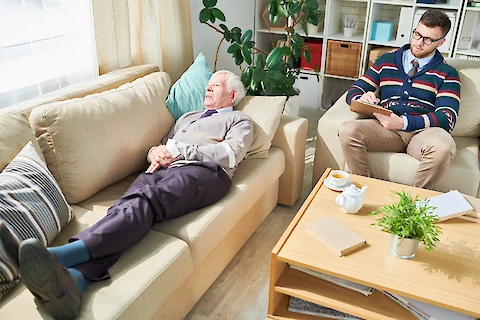
Recognizing the signs of Seasonal Affective Disorder (SAD) in male seniors is important not just for their overall health but also for their quality of life. Unfortunately, mental health matters in senior males often take a backseat, creating a void in attending to their unique psychological needs.
Senior Helpers Northern Utah has composed a detailed guide that zeros in on the symptoms of SAD. By understanding and identifying these symptoms, caregivers can ensure their loved ones receive the necessary care and support, encouraging them to navigate the challenges of SAD in a healthier and more manageable way.
Understanding Seasonal Affective Disorder (SAD)
Seasonal Affective Disorder, commonly known as SAD, is a type of depression that's related to changes in seasons. It begins and ends at about the same times every year, typically starting in the fall and continuing into the winter months.
The specific cause of SAD remains unknown; however, it's often linked to the reduced level of sunlight in fall and winter, which may disrupt the body's internal clock and lead to feelings of depression. In male seniors, SAD is unfortunately a common predicament that is frequently overlooked or misdiagnosed.
The Underserved Mental Health Space for Male Seniors
Mental health is a crucial aspect of overall well-being that sadly is often neglected in the case of senior males. This could be due to the societal pressures and stereotypes associated with masculinity, causing many men to suppress their feelings and avoid seeking help.
The discomfort around discussing mental health can lead to disregard for symptoms of disorders like SAD, making it all the more essential for caregivers to be vigilant about their loved ones' mental health.
5 Signs of SAD to Look Out For in Male Seniors
Recognizing the signs of SAD in male seniors can be a bit tricky, as they may differ from the symptoms commonly seen in younger individuals or women. Here are some indicators that may suggest a senior male is dealing with SAD:
- Noticeable changes in mood or energy levels: You may observe that your loved one seems downcast, lethargic, or shows a lack of interest in activities he once enjoyed, especially during the fall and winter.
- Changes in appetite or weight: SAD can cause an increased craving for carbs, which may result in weight gain.
- Sleep disturbances: He could be having trouble sleeping or, conversely, might be sleeping excessively.
- Social withdrawal: A man suffering from SAD might avoid social gatherings or activities, choosing instead to be alone.
- Difficulty concentrating: SAD can affect cognitive functions, making it harder for your loved one to focus.
If you or a loved one exhibits any of these behaviors, contact a healthcare provider as soon as possible.
How to Help Male Seniors With SAD
When you suspect a male senior in your care is showing signs of SAD, seek professional help. Mental health professionals can provide a proper diagnosis and recommend treatments like light therapy, medication, or psychotherapy.
As a caregiver, you can also play a supportive role. Create a comforting environment, encourage physical activities, maintain a balanced diet, and ensure they get enough exposure to natural light. Foster open and caring conversations about their feelings without judgment or pressure.
Senior Helpers Offers Personalized Care and Support for Seniors
Taking the first step towards recognizing and addressing Seasonal Affective Disorder in male seniors is a significant stride toward improving their emotional well-being. It's a journey that requires understanding, tact, and patience, but the impact can be profoundly rewarding.
As a trusted and experienced provider of senior care in Logan, Ogden, Smithfield, Roy, and Brigham City, Senior Helpers Northern Utah is ready to help. Contact us to learn more about our senior care services!